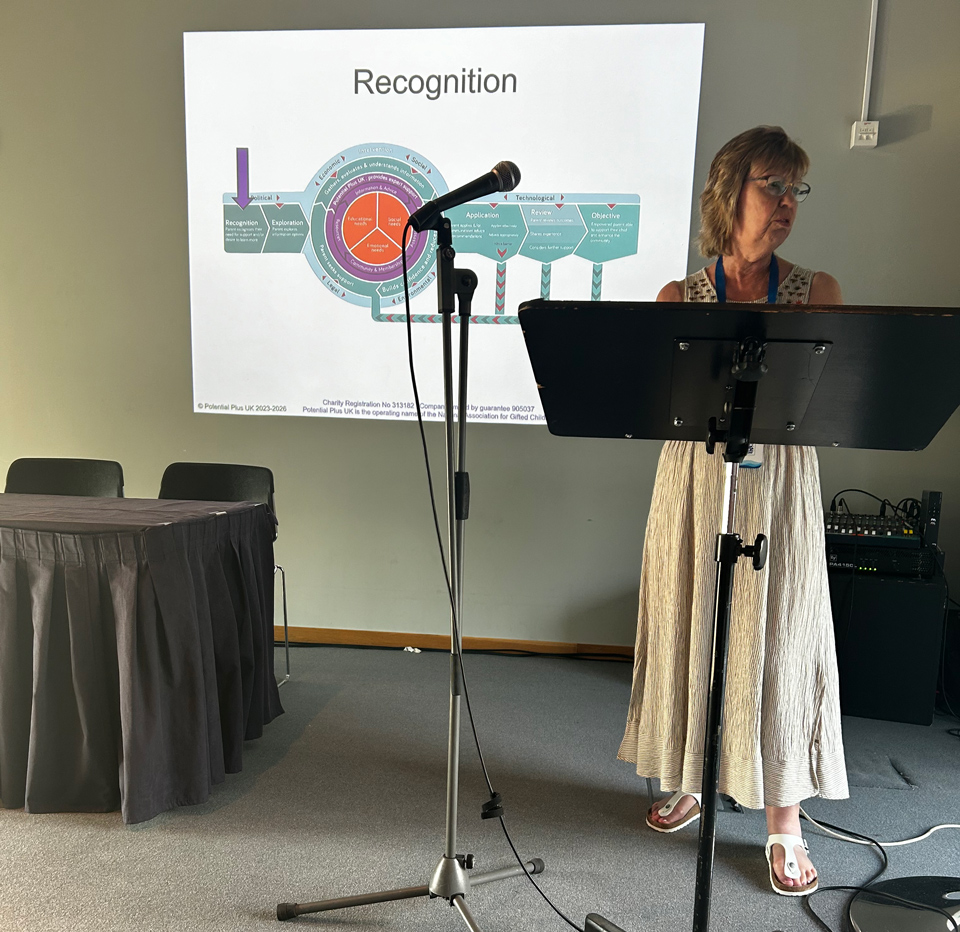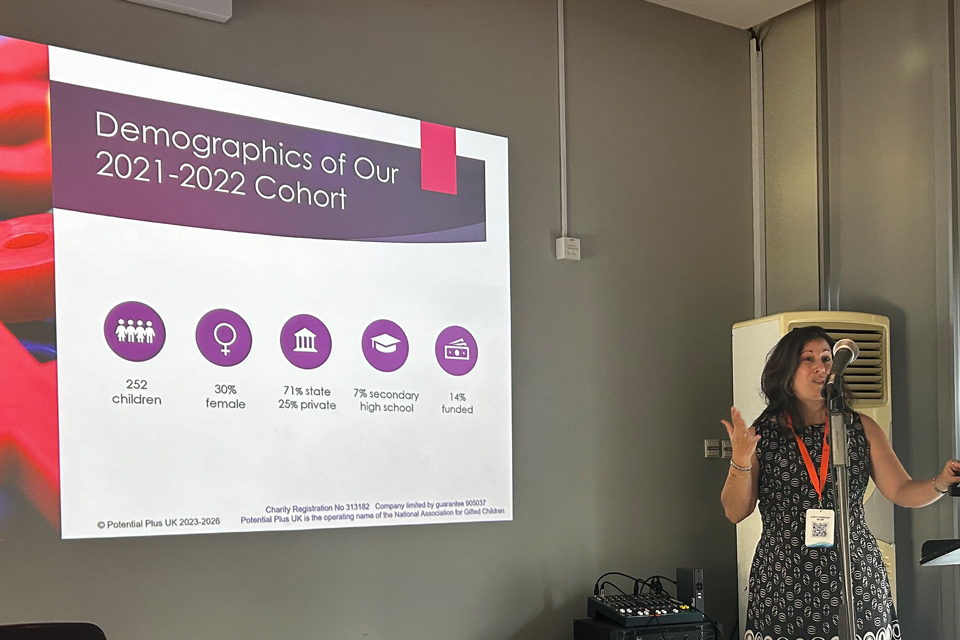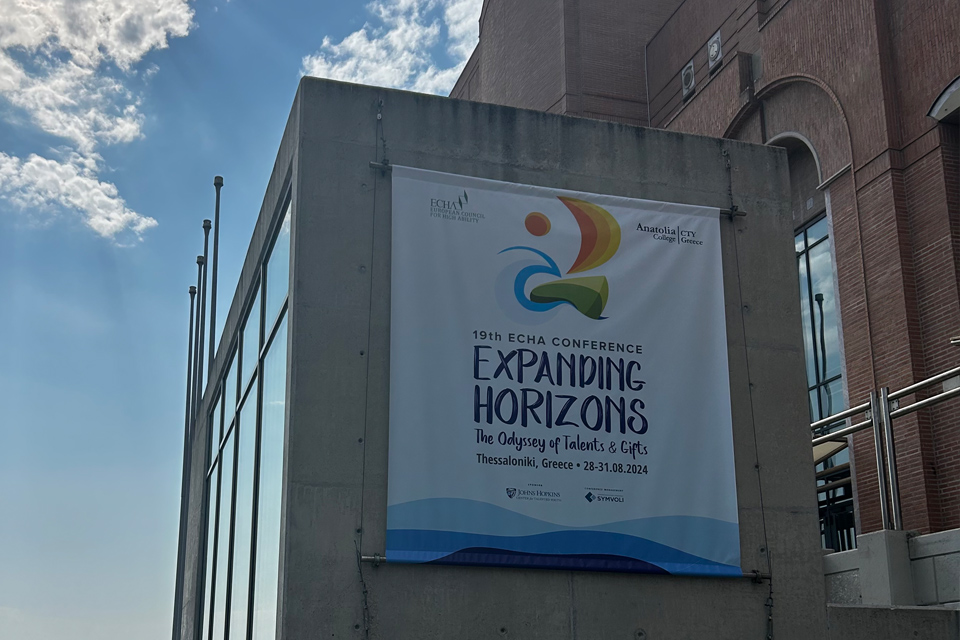Staff from Potential Plus UK were delighted to take part in this summer’s ECHA conference in Greece. The European Council for High Ability (ECHA) acts as a communications network, promoting the exchange of information among teachers, researchers, psychologists, supporting organisations and all people interested in high ability. Taking part in conferences like this (thanks to generous sponsors) enables Potential Plus UK to be part of a wider network, sharing the work we undertake in the UK and learning from others through multiple workshops and talks, looking at gifted education, identification, barriers and practice in different parts of the world.
It was great to listen to keynote speeches covering wide-ranging topics: tools for equitable and inclusive identification by Amy Shelton from John Hopkins University; talent development and successful provision planning by Del Siegle, from the University of Connecticut; and a comprehensive overview of how the field of gifted education has changed in the past three decades by Colm O’Reilly from the Irish Centre for Talented Youth, Dublin. Franzis Preckel, a professor of giftedness research and education at the University of Trier, Germany, provided a useful framework on talent development, which explained how potential develops during a lifetime, including spotting those ‘late bloomers’ who can be missed when measures of intelligence, such as early achievement and IQ, are used. While Eleftheria-Sofia Gonida, professor of educational psychology and human development at Aristotle University of Thessaloniki, offered a great talk highlighting the importance of motivation in self-regulated learning, how this is part of a virtuous circle and how a range of motivational pathways can help to reverse underachievement.
Three of Potential Plus UK’s staff members – Julie Taplin, our outgoing Chief Executive; Natalie Jensen, our Advice and Services Manager; and Andrea Anguera, our Assessment Services Manager – were invited to present talks and take part in panels.

In “A Model of the Parent/Caregiver Journey”, Julie Taplin provided information on Potential Plus UK’s current work developing a model of the journey parents take when trying to access support for their child. Once mapped as a linear process, from wondering about their child, to seeking information, to needing support, to gaining knowledge and to then helping to support others – our model shows that there is much more of a circular process to the parent’s journey, as children with high learning potential reach a new stage of their lives or education and parents return for more information and support. Understanding this can help us to develop services which support families even better. Julie also presented on a panel looking at how schools and families can partner to meet the needs of high ability children.
Natalie Jensen’s talk was about “Supporting Parents of Gifted Children in the UK: Insight and Intervention”. Our advice service offers personalised support to parents of children with high learning potential. Based on analysis of Potential Plus UK’s advice service 2023-2024, her talk illuminated the key challenges faced by parents currently raising children and young people with high learning potential in the UK and explored what professional support is necessary in the present educational climate. Research showed that meeting the socioemotional needs of gifted children is as important as nurturing their academic talents – themes commonly occurring included: mental health; support for children with additional needs, like ADHD, autism, dyslexia, dyscalculia, sensory issues; and struggles securing adequate support and resources from schools for all children with high learning potential; while perfectionism and/or asynchronous development were stress factors discussed in 20% of all advice calls. We hope to share Natalie’s talk, research and recommendations in full in a future blog.

Andrea Anguera presented “Identifying and Supporting High Ability in the UK Through an Assessment Service”. Potential Plus UK offers a number of assessments of high learning potential, providing a holistic assessment that uses both qualitative and quantitative data to understand a child’s needs. Andrea presented a quantitative analysis of data from our assessments – looking at the scores children achieved and the kind of recommendations that were shared in their reports in 2021-2022.
This analysis proved to be particularly significant in understanding the needs of children with dual or multiple exceptionality (DME). It showed that children with DME were those most underserved by education services – they were underdiagnosed (29% of children assessed were referred on for further diagnosis); had behavioural challenges; and disliked or refused to go to school. 68% of all children assessed that year had executive function challenges and the majority of children assessed during that year had sensory issues. Andrea offered several recommendations based on this analysis:
- Any child with a special educational need – or being assessed for a special educational need – should also be screened for sensory differences and this should be supported first.
- Any child displaying challenges with their executive function skills should also be screened for high learning potential.
- Where dual or multiple exceptionality is suspected, behaviour should be observed in the home environment, rather than in school. Currently, when a child is being assessed for a special educational need, it is normal for authorities to rely on information about behaviour in a school environment.
- When a child displays a poor attitude to school, they may need support with resilience and with developing a growth mindset.
The conference also offered us the chance to hear Margaret Sutherland, a well-known voice for gifted education in Scotland, who presented information with Catherine Reid on public debates and consultations in education. These consultations highlight that all parties in Scotland agree that a successful educational system is an essential requirement for the nation, but don’t agree on how it should look. Margaret argues that gifted education should be an integral part of the education system.
Sharing thoughts about her experience of the conference, Natalie commented that, as she is currently studying the ECHA diploma, she chose to attend sessions particularly focused on dual or multiple exceptionality and those looking at the social and emotional needs of gifted and talented children. She is eager to collaborate with international colleagues to improve wellbeing for these children and their families and was especially encouraged by the emphasis on parent support in several sessions, aligning with the core mission of Potential Plus UK, an area she is deeply passionate about.
We will be processing the incredible amount of information and research presented during those three days for some time to come. Supporting children and young people with high learning potential in the UK can sometimes feel very isolated but conferences like this highlight that we aren’t alone – throughout the world other organisations are also working to support bright children, their families and schools. Unfortunately, we cannot simply transfer a successful model from one country to another – cultural differences in attitudes to giftedness require different approaches – but sharing experiences between nations helps us to learn what can be achieved.
About the Author: Geraldine Glover is Potential Plus UK’s Community Information Coordinator. She is a Chartered Information Professional with a background in editorial work and information science. She is the mother of two children with high learning potential.






